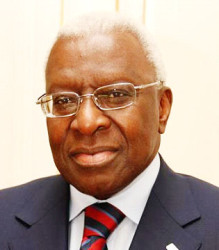PARIS,(Reuters) – Lamine Diack, the former head of world athletics, has been placed under formal investigation in France on suspicion of corruption and money laundering following a complaint from the World Anti-Doping Agency (WADA).

The inquiry, confirmed by the French financial prosecutor’s office yesterday, comes at a time when the image of world sport’s governing bodies is under serious scrutiny. There is a large-scale corruption investigation at soccer’s FIFA while athletics is fighting a desperate public relations rearguard battle in the face of continual doping issues.
According to French news channel iTELE, the investigation is focused on suspicions that payments were made in return for not revealing the widespread doping of Russian athletes.
The prosecutor’s office did not confirm that but said its investigation started when WADA alerted it to “acts of corruption and laundering involving members of the International Association of Athletics Federations (IAAF).”
Diack, from Senegal and an ex-long jumper who was born in 1933, headed the IAAF for the best part of a decade from 1999. He was held for questioning on Sunday together with his legal adviser Habib Cisse, who was also placed under formal inquiry on Tuesday.
Under French law, magistrates place a person under formal investigation when they believe there are indications of wrongdoing, but that does not always lead to a trial.
The investigation “concerns money movements and goes beyond doping,” a source in the French judiciary said.
The Monaco-based IAAF confirmed a police swoop took place at its headquarters on Tuesday “to carry out interviews and access documentation”. It said it was fully cooperating with the probe.
Diack’s son, Papa Massata Diack, stepped down from his role as an IAAF marketing consultant last year during an investigation into allegations of doping in Russia.
The head of Russia’s Athletics Federation (VFLA), Valentin Balakhnichev, has also resigned from his role as IAAF treasurer. Dr Gabriel Dolle, the director of the IAAF medical and anti-doping department, also left the federation.
Nikita Kamaev of Russia’s anti-doping agency RUSADA said in an interview with the Russian R-Sport news agency that his organisation was ready to help French investigators if contacted and Russian sports Minister Vitaly Mutko told the TASS agency that his country’s athletics federation had cleaned up its act.
“We have already said that there were problems with our federation, but the old management are no longer working there,” he said. “You have to understand that now there are a lot of criminal cases around the world, and it is not an easy situation to be in.”
A doctor in charge of anti-doping matters at the IAAF was also held for questioning in addition to Diack and Cisse.
Reuters was not immediately able to reach the three men for comment.
The IAAF’s new British president, Sebastian Coe, was at IAAF headquarters at the time of the police raid and “volunteered himself to answer any questions”, a source familiar with the investigation told Reuters.
“He answered any questions they wanted,” the source said. “But they did not come here to question Seb Coe.”
Coe, a two-time Olympic 1,500-metres champion elected IAAF president in August, was not immediately available for comment.
Elected on a strong anti-doping platform, Coe said this week in India: “It’s not uniquely a track and field problem. Every sport in the world has global issues. We have them but we also resolve them.”




